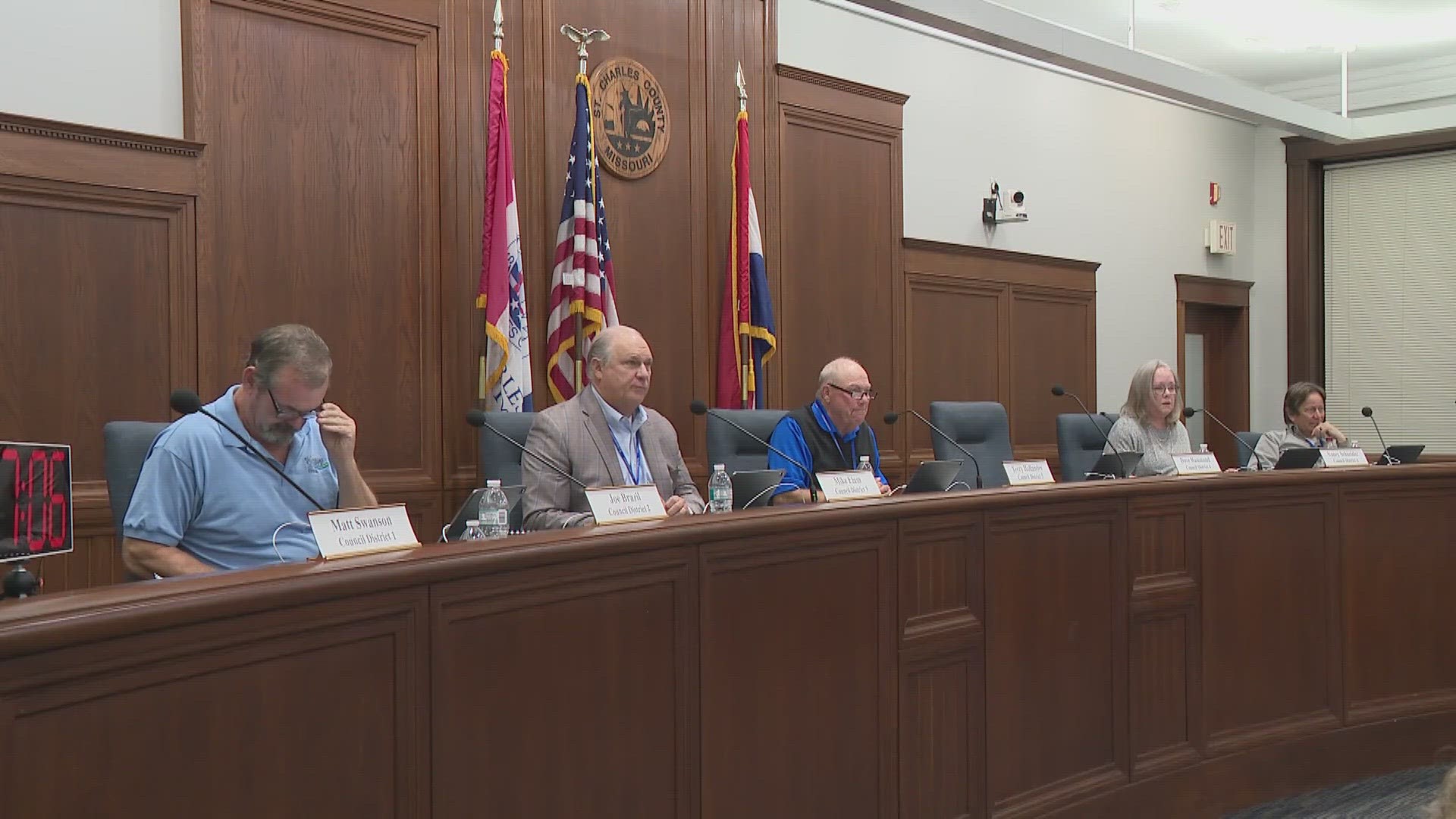ST. CHARLES COUNTY, Mo. — Leaders in St. Charles County voted 3-3 on a controversial immigration resolution Monday night.
The measure opposes a program allowing Latino immigrants to come to the region. The resolution needed four votes to pass.
On Nov. 13, the resolution was tabled at the council meeting due to two of the co-sponsors weren't in attendance. Three of the other council members, however, didn't support the measure in its current form.
On Monday, the St. Charles County Council met again to discuss and vote on Substitute Resolution 2308.
Joe Brazil is one of three county council members sponsoring the measure.
"This particular resolution is very specific and very clear on what the intentions are," he said.
After heated debate and unclear wording, Brazil tweaked the resolution opposing the importation of illegal migrants into the St. Louis Metropolitan region.
"It didn't go through the act of Congress, and it was signed. And so these 20 states are suing the federal government, Homeland Security, on this particular issue. And the other argument is, they're not legal, these immigrants are basically, in the eyes of 20 attorney generals, illegal immigrants," he said.
These lawsuits came after a federal program allowed people from Cuba, Haiti, Nicaragua and Venezuela to come to the United States. According to Brazil, this program is only funded for three months.
"Go through the process like everybody else went through. You can't just change the rules for a select few," he said.
The new resolution reads, "The St. Charles County Council strongly opposes the DHS's program, while litigation is pending."
Brazil said they also added that the council welcomes all legal migrants, but they have to "follow all applicable federal and state laws."
"Anyone who follows the federal laws and state laws, you're absolutely welcome to St. Charles County. We welcome you with open arms, but not if you're not following the federal law, period," he said.
State Senator Bill Eigel, (R)-District 23, showed up to the meeting speak in support of Brazil and the resolution.
"My policy on illegal immigrants has always been clear. Don’t let any more illegal immigrants in and send the illegal immigrants that are already here over the border," Eigel said
The International Institute of St. Louis, which works directly with Latino immigrants, responded with this statement to the tweaked resolution:
"The International Institute is pleased that the St. Charles County Council did reconsider the wording of Resolution 23-08, however, the final wording continues to conflate a legal humanitarian parole program with undocumented migrants. This resolution, at its core, will make immigrants—including those who are already here through legal immigration programs—feel unwelcome, which will ultimately hurt our region. We believe that our interests in growing and strengthening the St. Louis metro region are largely aligned with the St. Charles County Council and hope that this resolution will not pass as a representation of the community’s commitment to welcoming growth and our new neighbors."
Ahead of the meeting, Brazil was confident this resolution would pass and needed four votes.
"If you understand the law and you understand the intentions of the resolution, then you would be foolish not to support it," he said.
County Councilman Mike Elam said he hates the way this resolution paints St. Charles County.
"Resolutions like this do not represent a positive aspect. We need to be a positive voice in the region," Elam said.
Councilwoman Nancy Schneider also opposed the resolution while pointing out the language in the updated version was, "less offensive."
But it failed in a tied 3-3 vote with one member absent, Matt Swanson.
After the resolution failed to pass, the Migrant and Immigrant Community Action Project released the following statement:
Resolution 23-08 was racist, xenophobic, and misleading. MICA staff followed the arguments for and against the resolution both before and at the Council meeting. In this statement, we would like to voice two primary concerns: (1) the problematic narrative regarding immigration in the United States, and (2) the complexity of immigration law and harm stemming from binary narratives. Ultimately, we urge that St. Louis and the surrounding regions inform themselves regarding the true nature of immigration, the United States’ role as a driver of immigration, and to consider how the conversation can be shifted to better recognize the value and dignity of all people – regardless of status.
MICA joins many individuals and organizations who opposed Resolution 23-08. We add a critique of the most prominent narratives. Specifically, much of the debate focused on the legal status (or lack thereof) of the immigrants referenced in the resolution. Such conversations reinforce the idea that some immigrants are “good” and doing things the “right way,” and others are not.
Building a welcoming St. Louis means recognizing the dignity of all people. Immigration law is complex, and a person's "status" is rarely a simple binary. Even more important, status does not reflect a person's worth. Often, immigration law and policy reflect foreign policy and economic interests, which do not reflect a person's deservingness. Further, U.S. immigration policies have historically been tainted by racism and nativism.
We envision a St. Louis that recognizes the dignity of all people, regardless of their status. We will continue to work toward ensuring that St. Louis is a welcoming region for all, and we invite you to join us.
About the MICA Project: MICA is a community organization committed to working with low-income immigrants to overcome barriers to justice. MICA utilizes legal services, organizing, advocacy, and education to promote the voice and human dignity of immigrant communities. MICA envisions a safe and welcoming community for immigrants, in which all share an understanding of the dignity and worth of all people.
Want more political news delivered straight to your inbox? Sign up for our 5 On Your Side Politics newsletter.

